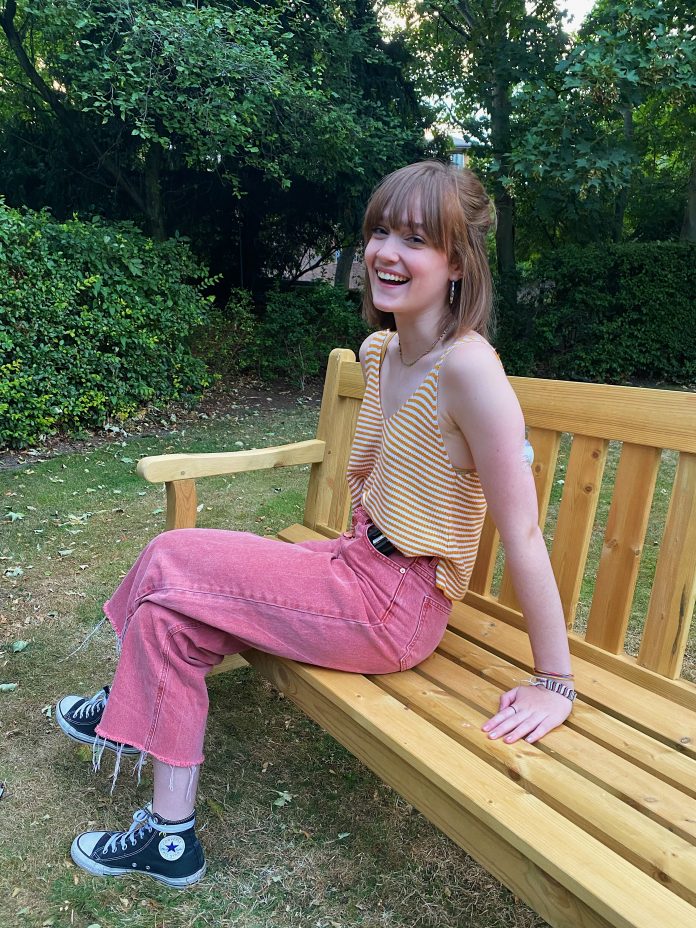
Rather than returning to the College of William and Mary for her sophomore year, Cameron Lynch ’23 has spent the first weeks of the Fall 2020 semester pursuing advocacy work more than 3,000 miles away from Williamsburg. From her home in London, Lynch has worked extensively to organize a new support group designed to uplift immunocompromised college students, both on and off campus.
Lynch, a sociology major, began this initiative in June after she penned an open letter to the College community articulating her concerns that people were neglecting their social distancing and mask-wearing responsibilities. As an immunocompromised student, she feared that she would not be able to safely return to campus if adherence to COVID-19 safety protocols deteriorated.
“I was seeing a lot on social media that people had stopped caring about social distancing and about COVID in general,” Lynch said in an email. “As an immunocompromised teenager, I’m still very much hunkered down. I’m still in complete isolation, so I felt very disrespected by what I was seeing.”
“I was seeing a lot on social media that people had stopped caring about social distancing and about COVID in general,” Lynch said in an email. “As an immunocompromised teenager, I’m still very much hunkered down. I’m still in complete isolation, so I felt very disrespected by what I was seeing.”
After publishing her letter, Lynch heard back from multiple other immunocompromised students, who expressed similar frustrations about a lack of responsibility among some young people. who sometimes incorrectly perceive only elderly individuals as suffering from severe complications related to COVID-19. These initial conversations sparked Lynch’s decision to forge a more formalized community space with other students who were also apprehensive about returning to campus in the fall given their health circumstances.
Around the same time that Lynch began formulating plans for an immunocompromised support group, universities throughout the United States began announcing their reopening plans for fall 2020. The College released its initial Path Forward plan June 12. In their plans of return, Lynch and her peers were disappointed to see that many colleges had failed to provide substantive guidance for students suffering from chronic health conditions.
“We started realizing how not a single school had acknowledged immunocompromised students in the state of Virginia,” Lynch said. “When William and Mary released their first statement, they claimed that students with health concerns could take a semester off. I just was really upset by that reaction, because it was like, ‘you’d rather I not come at all than work with me?’”
“We started realizing how not a single school had acknowledged immunocompromised students in the state of Virginia,” Lynch said. “When William and Mary released their first statement, they claimed that students with health concerns could take a semester off. I just was really upset by that reaction, because it was like, ‘you’d rather I not come at all than work with me?’”
Since not all of the College’s fall 2020 classes are accessible online, Lynch ultimately chose not to return to campus. This choice has affected her graduation timeline as some of the classes she wanted to take were not available in a remote format. Before finalizing those plans, Lynch communicated with Student Accessibility Services, College President Katherine Rowe and staff at the McLeod Tyler Wellness Center, including Associate Vice President for Health and Wellness Kelly Crace. Lynch said they were generally helpful in supporting her throughout her decision-making process.
“… They’ve been super helpful and amazing to try to make sure there’s support for immunocompromised students right now with mental health, because I know a lot of students have been in complete isolation and will continue to be, so it’s helpful to have some of those resources,” Lynch said.
As she continued to negotiate and discuss her fall semester plans with the College, Lynch’s advocacy on behalf of herself and other disabled studentsstudents with disabilities was covered in USA Today, and she was contacted by reporters at BBC, the Washington Post and the Chronicle of Higher Education — illustrating a testament to her efforts to pressure universities into providing greater support for their vulnerable populations.
In lieu of in-person classes in Williamsburg, Lynch will pursue coursework through the Washington Center this fall, since it offers completely remote classes. Additionally, she is excited to begin a new full-time internship this fall in London working for Disability Rights UK, a British advocacy organization.
“I’m going to get a lot of the same work I’ve been doing this summer throughout the semester, which is really amazing,” Lynch said. “I’ll be taking night classes through the center, so it gives me an opportunity to be involved in the community and still be a part of the school.”
However, arguably the most vital way Lynch will continue being an active member of the College community is through her immunocompromised student support group, which already has 15 members involved who meet through weekly Zoom meetings. Regardless of where disabled or immunocompromised students may find themselves this semester, Lynch hopes that the support group will provide some comfort for individuals who have been disproportionately affected by the pandemic.
“This is a student-run group that aims at continuing to have a community whether remote or on campus,” Lynch said. “Membership is open to any student that identifies as being immunocompromised, at-risk, or disabled. It is a safe space for students to share their frustrations, small wins, and ways of maintaining sanity in the midst of COVID-19 and beyond.”
